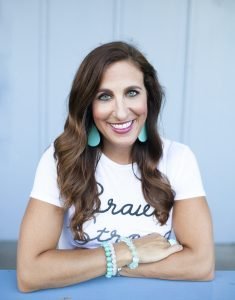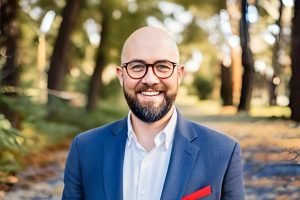Last updated on August 18, 2022
Rodney Mueller is the inventor of the Perfect Aim Method, which is central to his work with clients from startups and tech companies. Here he shares about his journey building his coaching business—including various “redesigns” that required getting uncomfortable in order to help his practice evolve into a business that brought Rodney greater freedom and satisfaction. We hope you enjoy this interview!
Coaching Focus: My current coaching practice is primarily composed of high-growth startup CEOs, small business owners, and highly professional and competent colleagues in the coaching industry. I primarily work one-to-one with my clients 3 times per month, in a year-long transformational coaching program.
Location: Saint Louis, Missouri, USA
Connect: You can find Rodney online at his website, as well as on Instagram and LinkedIn.
Tell us about your journey as a coach.
I got started as a coach in my late 20s. I had achieved many of the things that I thought would make me happy at a young age: I was working in diabetes care sales for a great company making six figures, had bought a house, met my wife, had run 9 marathons, and was 10 years into a 24-year career in the Army Reserves; yet I found myself exhausted, disconnected, and unfulfilled.
I discovered a Coach Training and Leadership Development Program that was talking about many of the things I had been drawn to since I was 5 years old, as I was a huge follower of Oprah over the years. They were reading books like The Power of Now and A Course in Miracles. I decided to take the program to grow as a leader and ended up realizing I was meant to be a coach.
Two years later, I quit my job, and I have been coaching full-time now since 2012. I started coaching anybody on anything, one relationship at a time. It was really hard at first, but now I’ve gained a huge level of confidence in my gift and its value and have learned to trust myself, trust other people, and trust spirit in the process.
We want to destigmatize talking about money, including how much coaches make. Would you please share with our readers any relevant revenue figures from your business?
My very first client was paying something like $100 a month for four sessions. A year later, I was charging $500 per month and had around three clients. It has not been a straight ride up, and that is the nature of a coaching practice. It has its ups and downs, but I’ve grown my business every single year over the last ten years, reaching a new peak at just over $200,000 per year.
The biggest shift I had was when I realized about 5 years into my coaching business that I had become dissatisfied with my job—the job I had designed. I designed it in a way that had me working too much, with too little flexibility, and not making enough money.
I did the work to redesign my “job” in a way that was more joyful and rewarding. I reduced sessions from 4 per month to 3 per month, shifted my coaching services from month to month to a year-long program, and nearly doubled my rate. I did all of this with the client in mind, while also honoring my highest self and what it needed to do its best work.
I was terrified to take this leap, but it worked immediately (assuming you aren’t counting the 5 years of coaching, therapy, and healing that led up to this moment). I nearly doubled my revenue that very year from around $85,000 a year, feeling really shaky, to $160,000, and have grown since.

I’m now at a similar plateau where my business is requiring a redesign. It’s a scary thing to redesign something that’s been working, but that is the nature of creating a successful coaching practice over time if you don’t want to get burnt out or stagnant.
I now have my sights set on how to best leverage this incredible gift for coaching, leadership development, sales training, and strategic business planning in a way that has greater impact, more joy, and more income. My next income target is working toward $400,000 or more per year, and I think that is very attainable if I’m willing to get uncomfortable again.
What courses, programs, or certifications have you done? Would you recommend them, and for whom?
- Accomplishment Coaching Coaches’ Training Program – This is a year-long, ICF-accredited coach training program. It is excellent, and I highly recommend it if you are serious about your own development and honing the skills most needed to create a successful coaching practice over time.
- Professional Certified Coach (PCC) Credential – Helpful for development as a coach and learning to have more impact with less “effort.”
- 360 Assessments are very helpful for leadership coaching engagements or organizational coaching engagements. They are most helpful for clients in scenarios where they didn’t choose you or you need objective “evidence” to focus the coaching work.
What advice or perspective might you give to a new coach trying to get their first clients? Any advice they should ignore?
Getting your first clients is not a quantity game; it’s a quality game. Focus on building trust and/or starting your coaching practice with people who already trust you. Many coaches make the mistake (myself included) of trying to build their practice by starting with strangers. You want to start with the opposite. Talk to people that you’ve already built trust with, invite them to a conversation, and be of extraordinary service to them.
Second biggest tip: Consider having what I call a “High-Value Pro Bono Client.” This is someone who you’d LOVE to work with, who would be a great energy-giving client, and is likely to help you build trust in communities or with the type of clients you would love to work with.
My first “High-Value Pro Bono Client” who I worked with for free for four years became the CEO of a billion-dollar startup, gave me the opportunity to invest in the business, and granted advisor shares. That client who paid me zero in dollars will likely generate more income than the last ten years of my coaching work combined.
All of this to say, be of service to others and keep building your relationship to the value of your being (coaching).
What are your thoughts on “choosing a niche” as a coach?
I wouldn’t focus on a niche when you first get started. I would coach anyone on anything. The best niche is not the one you make up with a marketing person; the best niche is the one that comes from understanding and articulating your own heroic journey.
Anyone who becomes a coach has a superhero story that loosely follows the hero’s journey. They were ordinary, just living their life, then they dealt with some challenge or ordeal, they met that challenge, overcame it, and are now sharing those insights with others.
This is what I call the “spiritual niche,” and it’s for sure the most effective and fulfilling way to build a successful and sustainable coaching practice.
What books have significantly influenced your life? What are your key takeaways from these books?
So many books:
- The Last Word on Power by Tracy Goss – The title really does say it all. The first 3-4 chapters are a little boring. Hang on for the good stuff! All about the true nature of power and how to harness it for good. Essential reading for leaders, coaches, and executives.
- 80/20 Principle by Richard Koch – Sounds simple, but it goes deep into the importance of how we spend our time and energy.
- Soul Stories by Gary Zukav – He was introduced to me by Oprah. This book was the first one to awaken me to a whole new world of the unseen, unconscious parts that I knew were there but didn’t have language or understanding for.
- A Return to Love: Reflections on the Principles of A Course in Miracles by Marianne Williamson – One of the first books to really deepen my sense of spirituality and bridge my own philosophy and spirituality using Christian language. It helped me to see the connection between it all.
If you received an extra $10,000 to spend on your business, how would you spend it and why?
Because I’m ten years in, I’d spend it on a great marketing partner. I hate doing self-promotion, social media, and marketing, and I’m at a stage in my business where it would really support me with teaching other people about my process, sharing insights, and making a broader impact.
If you’re new, don’t spend it on marketing. Spend a little on creating a decent brand and website, and spend the rest on self-development—whether that’s coach training, mentorship, having your own coach, or addressing opportunities for personal healing.
What are some of your favorite affirmations, mantras, thoughts, and/or journal prompts currently? Why?
- “Let go and Let God.”
- “I trust that everything happens for a reason, even when we aren’t wise enough to see it.” – Oprah
When you feel overwhelmed, stressed, or have lost your focus or motivation, what do you do?
My inclination is to work harder. One of the most important lessons I’ve learned is that coaching is much different than other professions.
Working harder doesn’t equal more success. In fact, it has the opposite effect. It sounds crazy, but it’s true: a coach’s job is to spend all the time they need living a great life, taking care of themselves and taking vacations, and doing things that inspire them, things that are restorative and recreational.
People don’t want to work with people who are overwhelmed, stressed, and unmotivated. You don’t have to be perfect, but it’s really important to do whatever it takes outside of the time you are directly coaching people to show up as your best self in those sessions.
Specifically for me, I usually need some time off when I’m feeling overwhelmed, stressed, or unmotivated. That may mean planning a vacation or going to a movie in the middle of the day or spending time with my daughter.
Sitting in front of my computer trying to make myself get clients is a terribly unpleasant experience. If it worked, I’d say go for it… but in my experience, it doesn’t work, and it sucks.
So, live a great life, take excellent care of your energy and spirit, and show up the best you can for the 3-15 hours a week you’re actually coaching someone. That’s the job.
Do you have any examples of how a “failure” set you up for later success?
About 8 years ago, I was hired for a big speaking engagement to speak at three regional conferences for Business Network International (BNI). It was an amazing opportunity to speak to hundreds of potential clients.
I prepared what I thought was an excellent 45-minute keynote. I rehearsed and rehearsed and rehearsed. Then I delivered the first of the three keynotes.
I thought it went pretty well until I got a call the Monday after the event to tell me that the members didn’t like it and that they were canceling my appearances in the other two keynotes.
OUCH!!!!
I was really hurt, especially since I had put so much work into it and since I had given other successful keynotes in the past.
Once the sting of rejection wore off, I was able to pick myself back up and assess why this one had been such a disaster and why others had been successful.
The difference? Storytelling. Storytelling is a secret language that we all know but not all of us realize how important it is in communicating deep topics, building trust, and creating interesting, inspiring performances.
My successful keynotes were modeled after TED Talks, which place a massive emphasis on using story to emphasize key learnings.
From that failure, I discovered the key to communicating with impact that has guided every client interaction, networking, and speaking engagement since then.
I’m now incredibly confident in my keynotes and my ability to hold an audience in an engaging and impactful way.
If you could put a message on a huge billboard—getting a message out to millions—what would it say and why?
“Parents:
Your child’s spirit is the most precious gift. Nurture it, don’t crush it.
Don’t let your fear or ego hit them, shame them, scare them, dominate them or force them.”
Why: We live in a world where we accept highly dysfunctional, abusive, soul-crushing behavior from adults as normal or ordinary. We don’t understand the nature of trauma and dysfunction. We don’t understand what it takes to heal it or the impact of it on humans for a lifetime.
One hundred years from now, we will be disgusted by our actions, and one hundred years from then, we will be completely sick over what we call normal today.
The Life Coach Magazine staff is your team for high-quality content on topics from personal development, to coaching tips, to how to grow your coaching business.










Be First to Comment